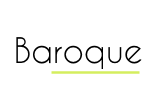|
|
|
|
 |
Engraving Gallery
1670s
all
images open in a new window
France and England
|
 |
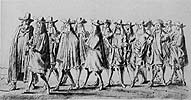 Procession,
1674. English Procession,
1674. English |
 Gentleman,
1675 Gentleman,
1675 |
 Gentleman,
1675 Gentleman,
1675 |
 Gentleman,
1675 Gentleman,
1675 |
 Gentleman,
1678 Gentleman,
1678 |
 Charles
II. English Charles
II. English |
 Officier. Wearing a large brimmed hat, not turned back yet. The early
rather straight Justaucorps is tailored to the figure, the
skirts not flared yet, and made from brocade. Ribbon bows
en masse at the sides of his rhinegraves over culottes (breeches) and on the waistband. Note: the justaucorps doesn't
reach down to the knees yet, 1673. French Officier. Wearing a large brimmed hat, not turned back yet. The early
rather straight Justaucorps is tailored to the figure, the
skirts not flared yet, and made from brocade. Ribbon bows
en masse at the sides of his rhinegraves over culottes (breeches) and on the waistband. Note: the justaucorps doesn't
reach down to the knees yet, 1673. French |
 Officier,
The hat begins to be gently cocked up, adorned with ostrich
plumes, arranged in a radial. Small ribbon bows on each sides
of his wig in the front. The baldrick is very broad. Note:
the sash with a tasselled fringe, knotted on the left side,
1675. French Officier,
The hat begins to be gently cocked up, adorned with ostrich
plumes, arranged in a radial. Small ribbon bows on each sides
of his wig in the front. The baldrick is very broad. Note:
the sash with a tasselled fringe, knotted on the left side,
1675. French |
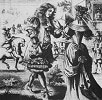 Noble
Couple, 1671. French Noble
Couple, 1671. French |
 Court
Dress, Hairdress à la Duchesse with Cruches,
long locks falling over her shoulders. Narrow pearl necklace
with cross. Note: the manteau is by now held back with jewelled
fasteners. The long trained manteau is lined with a
brocaded fabric, 1679. French Court
Dress, Hairdress à la Duchesse with Cruches,
long locks falling over her shoulders. Narrow pearl necklace
with cross. Note: the manteau is by now held back with jewelled
fasteners. The long trained manteau is lined with a
brocaded fabric, 1679. French |
 Summer
Dress, 1675. Summer
Dress, 1675. |
 Summer
Dress. The lady is wearing the hurluberlu coiffure,
covered with a lace headscarf. Note that the manteau isn't
yet held up with ribbon bows or jewelled fasteners, but instead
held back with one hand or by a page, so that the lining is
seen of the robe, as well as on the turned back cuffs
on her sleeves, 1673. French Summer
Dress. The lady is wearing the hurluberlu coiffure,
covered with a lace headscarf. Note that the manteau isn't
yet held up with ribbon bows or jewelled fasteners, but instead
held back with one hand or by a page, so that the lining is
seen of the robe, as well as on the turned back cuffs
on her sleeves, 1673. French |
 Winter
Dress, Hurluberlu coiffure worn with a coeffe (two gauze-veils). Patches in her face. She is wearing pearl
earrings in drop shapes and a one row pearl necklace, as well
as a pearl bracelet over her chemise sleeves. The robe (upper skirt with train) is made from fur with a broad lace
volant, the jupe has two lace volants, called pala.
1678. French Winter
Dress, Hurluberlu coiffure worn with a coeffe (two gauze-veils). Patches in her face. She is wearing pearl
earrings in drop shapes and a one row pearl necklace, as well
as a pearl bracelet over her chemise sleeves. The robe (upper skirt with train) is made from fur with a broad lace
volant, the jupe has two lace volants, called pala.
1678. French |
 Summer
Dress, 1670s, Note the extensive use of broad laces on
her apron, and what looks like a cape. French Summer
Dress, 1670s, Note the extensive use of broad laces on
her apron, and what looks like a cape. French |
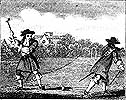 Two
Men Playing Pell Mell, early 1670s. It is interesting
to note, that they are wearing flounces on their breeches,
those flounces could be from the stockings (remains of the
fashion of the lace topped boothose) or they could be attached
to the breeches, the so-called cannons. English Two
Men Playing Pell Mell, early 1670s. It is interesting
to note, that they are wearing flounces on their breeches,
those flounces could be from the stockings (remains of the
fashion of the lace topped boothose) or they could be attached
to the breeches, the so-called cannons. English |
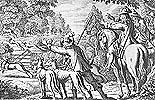 Coursing
Fallow Deer with Greyhounds, early 1670s. The sword is
still worn on a baldrick, only in around 1685 did the sword
waistbelt come into use in the military. Note also there are
no buttons yet at the centre back vent of the coats. By Wenceslaus
Hollar. English Coursing
Fallow Deer with Greyhounds, early 1670s. The sword is
still worn on a baldrick, only in around 1685 did the sword
waistbelt come into use in the military. Note also there are
no buttons yet at the centre back vent of the coats. By Wenceslaus
Hollar. English |
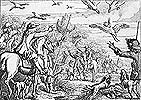 Hawking
of Herons, early 1670s. Note that the gentleman on the
horse is wearing high heeled long boots with obviously a lace
topped boothose in them, while his footman is wearing low
heeled, practical shoes which are fastened with a ribbon,
and still have the cut-out insteps from earlier. By Wenceslaus
Hollar. English Hawking
of Herons, early 1670s. Note that the gentleman on the
horse is wearing high heeled long boots with obviously a lace
topped boothose in them, while his footman is wearing low
heeled, practical shoes which are fastened with a ribbon,
and still have the cut-out insteps from earlier. By Wenceslaus
Hollar. English |
 Mary
of Modena, 1670s. Mary was the second wife of James, Duke
of York. Unusually, here she is portrayed wearing a
man's clothing - brocaded coat, shirt and cravat. Although
this is a painting, it is in this section, because no colour
reproduction was available. Painting by Verelst. English Mary
of Modena, 1670s. Mary was the second wife of James, Duke
of York. Unusually, here she is portrayed wearing a
man's clothing - brocaded coat, shirt and cravat. Although
this is a painting, it is in this section, because no colour
reproduction was available. Painting by Verelst. English |

Paintings
Early | 1660s | 1670s | 1680s | 1690s | 1700s
Dutch
Paintings 17th century
Dutch
Page I | Dutch
Page II | Dutch
Page III | Dutch
Page IV
Engravings
Early | 1660s | 1670s | 1680s | 1690s | 1700s
Artists - Costume
References
Contents © N. Kipar 1997 |
|
|




